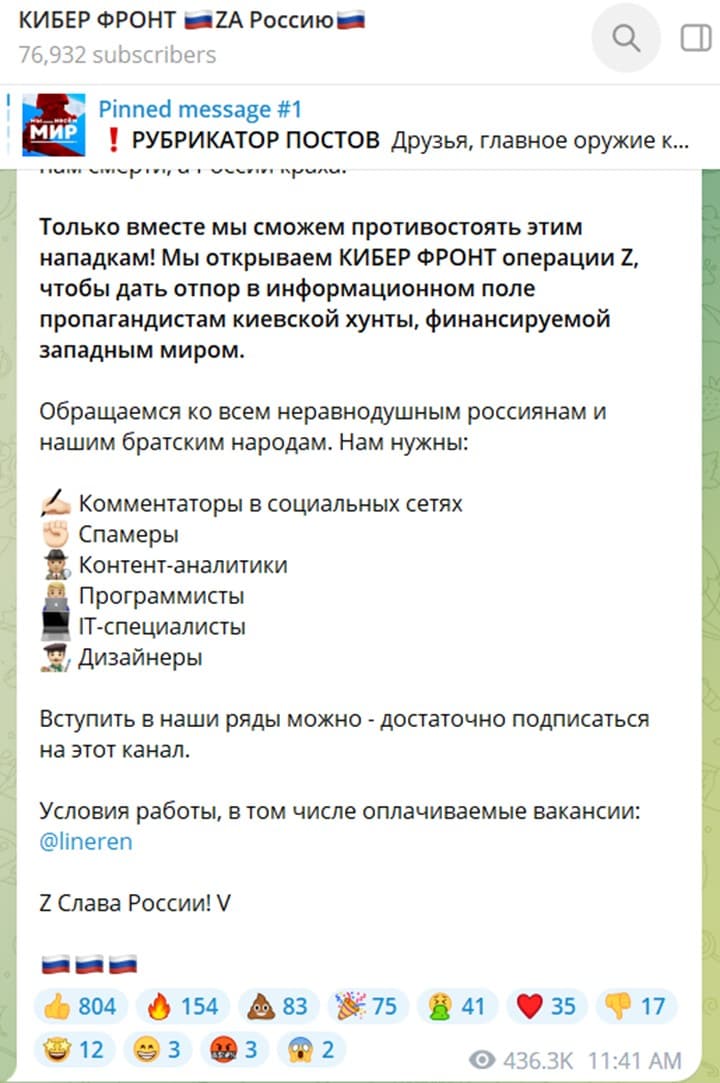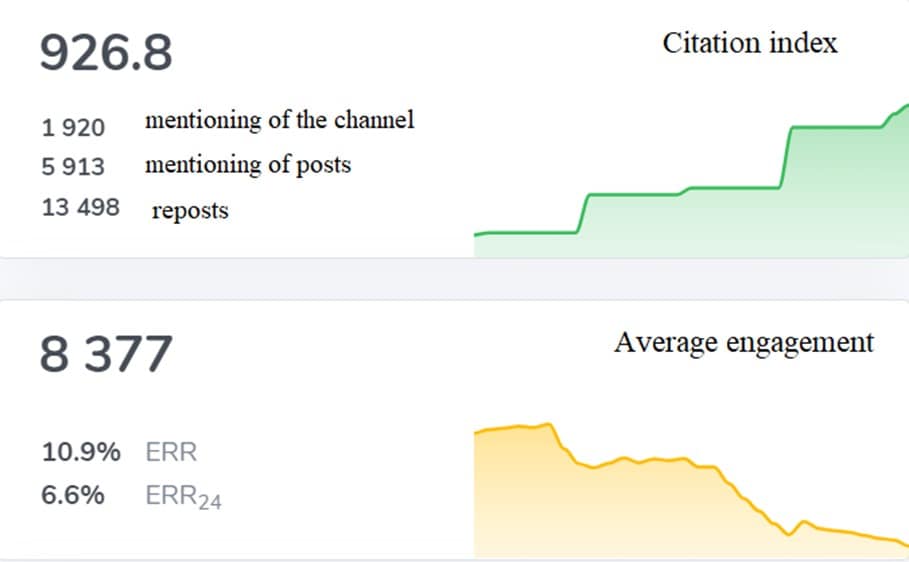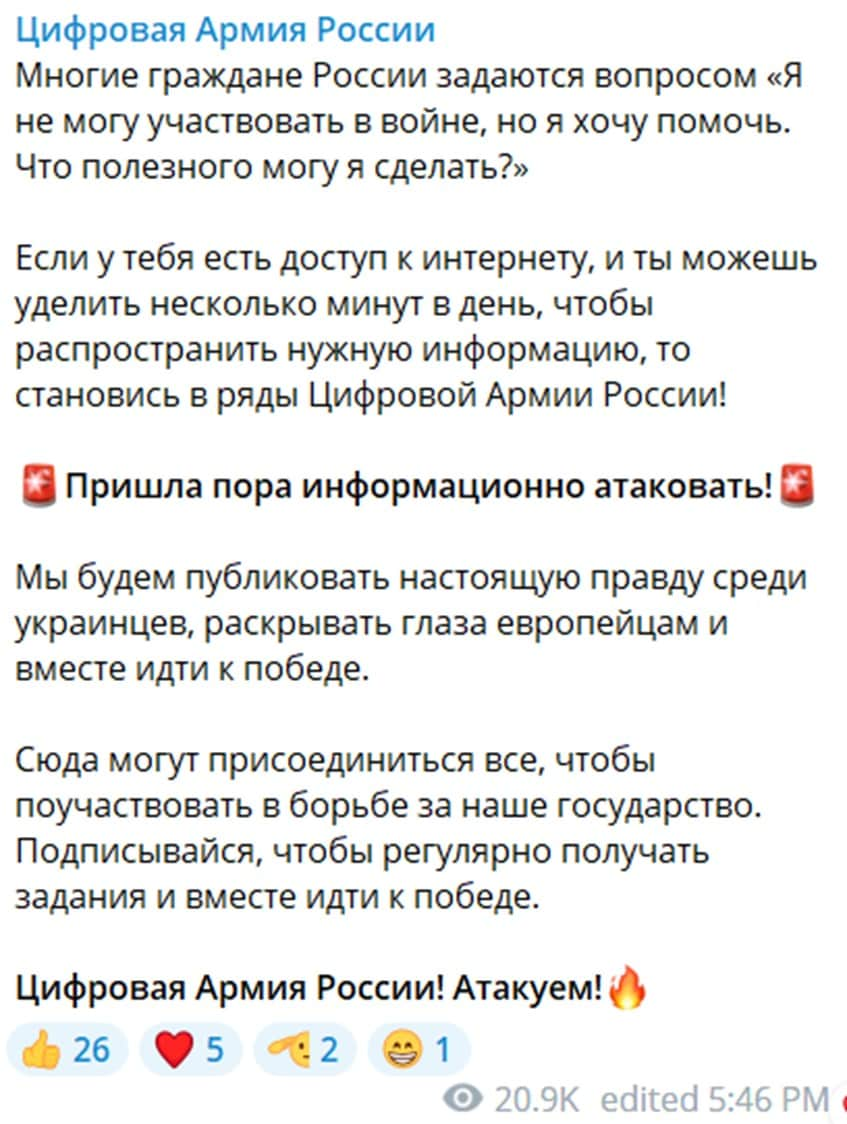Since the beginning of the war in Ukraine, the Kremlin has sought to tighten control of cyber space, not only through legal and technical means but via "information-psychological ones." In 2019, laws on the "sovereign Internet" were passed in Russia demanding that Internet providers store and transfer information about users to the state while the Russian Criminal Code was changed to effectively prosecute Internet users.[1]
"There Is Another War – An Information-Psychological War"
On May 20, 2022, during a Russian Security Council meeting, Russian President Vladimir Putin said[2] that a "mass-scale information war" has been waged against Russia, noting a growing number of cyberattacks on Russian infrastructure. According to the Russian Foreign Ministry, the number of cyberattacks on Russia in 2022 increased by 80 percent. In 2022 there were more than 25,000 cyberattacks on the state Internet resources and 1,200 "incidents" at critical infrastructure facilities.[3]
The Russian state presents a war narrative to affect the sentiments of the Russian public. According to this narrative, the West is trying to "convert" Russians toward Western values. The target of this war is the "Russian youth." During an address at the Federal Assembly on February 21, 2023, Russian President Vladimir Putin said: "They [the West] lie constantly, they twist historical facts, they continue to attack our culture, the Russian Orthodox Church, and other traditional religious organizations. Look what they are doing to their own people. The destruction of the family, of cultural and national identity, and the perversion of children are declared to be the norm."[4]

Vladimir Putin during his address to the Federal Assembly on February 21, 2023.
First Deputy Head of the Presidential Administration of the Russia Sergey Kirienko has said: "There is another war – an information-psychological war, and we must realize that it will be the longest, because its targets will be the younger generation."[5] This narrative of a "struggle against the West" is quite important to Russian authorities.
The first attempts to influence public opinion using social networks were made in the early 2000s. In 2013, the Novaya Gazeta newspaper published an investigation on the operations of the Internet Research Agency, which is associated with the Wagner PMC head Yevgeny Prigozhin. The Internet Research Agency, or "troll factory," was engaged in disinformation, forming public opinion, and the vilification of the Russian opposition. Many accounts controlled by the Internet Research Agency propagated the required information on Russian social networks and were paying for articles and posts by Russian bloggers and media personalities.[6]
The "Internet Troops of Ukraine" And Russia's "Cyber Front Z"
On February 28, 2022, the Ministry of Digital Transformation of Ukraine, together with the Ministry of Culture and Information Policy, launched[7] the "Internet Troops of Ukraine" initiative.[8] The idea was to use Internet users for pro-Ukrainian messaging on social media.[9] In contrast to the "troll factory," the initiative mostly deployed volunteers, not employees, and tens of thousands of users participated in the initiative on many media platforms.[10]
In March 2022 the "Cyber Front Z" project was created[11] in Russia. The project used tactics similar to those of the "Internet Troops of Ukraine," trying to draw Internet users to participate in messaging efforts. In the first post, published March 12, 2022, "Cyber Front Z" was sought supporters to repost content,[12] content analysts, programmers, and IT specialists, "The more successfully our soldiers fight the 'plague' in Ukraine, the more fakes and information attacks on our people appear. The Ukrainian propaganda machine is working at full speed. They wish for our death and the collapse of Russia." According to the post, in order to join, users needed only to subscribe to the channel. In addition, the post stated that there are also paid vacancies.

The first post of "Cyber Front Z" project in Telegram reads: "Only together we can resist these attacks! We are opening the KIBER FRONT of Operation Z to fight back in the information field against the propagandists of the Kiev junta funded by the Western world."
The Telegram channel for "Cyber Front Z" describes itself as "the digital troops of Russia" and has about 77,000 subscribers. Alexey Nekrylov was the curator of the project. In March 2022, a journalist from the St. Petersburg-based "Fontanka media" tried as part of an investigation to apply for a paid job at "Cyber Front Z." During the "job interview" for a journalist, the job was described as follows: "The work is not difficult, you will have to write comments on Telegram and other platforms. Chats and channels will be provided to you by curators; they will also tell you how to write rebuttals [to the information provided by Ukrainian media or users] and what meaning to put in them. You do not need to write a lot of text: two or three sentences are enough."[13] According to one of the curators for YouTube channels, the job consists of creating a "patriotic atmosphere" in the comments sections under trending political or news videos.[14] The office of "Cyber Front Z" was located on the premises of the St. Peterburg "Arsenal" plant.
The posts on the channel do not get many views on average compared to the channel's unusually high citation index, which is calculated based on how often the channel is mentioned and its posts are reposted. The majority of posts are made after 10 am and are shared or viewed within an hour, after which the engagement drops. "Cyber Front Z" also has VKontakte group[15] with about 1,500 subscribers and a YouTube channel with few subscribers and content.[16]

The graphs show the discrepancy between the engagement of a post on the "Cyber Front Z" Telegram channel and channel's the citation index of the from July 7 to August 6, 2023. Source: TGStat service.)
Such a discrepancy can be attributed to the fact that certain users repost the material many times or reference the "source channel" in another way. Such users constitute about five percent of the posts' viewers.[17]
Interestingly, "Cyber Front Z" also had a discussion club that was meeting in the St. Petersburg café Street Food Bar No. 1, which was provided to the "front" for this purpose by Yevgeny Prigozhin, who is head of the Wagner Group and the "Troll Factory." On April 2, well-known Russian pro-war blogger and militant Vladlen Tatarsky, whose real name is Maxim Fomin, was assassinated in the Street Food Bar No. 1 during a Cyber Front Z meeting. Vladlen Tatarsky was known as the owner of the pro-war "Govorit TopaZ" Telegram channel, which at its peak had more than 590,000 subscribers.
In January 2023, the Telegram channel "Digital Army of Russia,"[18] which has about 19,000 subscribers, was created. The first post, published[19] on January 21, 2023, urges readers to join the group: "If you have access to the Internet and can spare a few minutes a day to spread the correct information, then join the ranks of the Digital Army of Russia! It is high time for an information attack!" The main focus of the group's operation are Ukrainian-speaking platforms and users.

The first post of the "Digital Army of Russia" channel reads: "We will publish the real truth among Ukrainians, open the eyes of the Europeans and together we will go to victory. Everyone can join and participate in the fight for our state… Digital Army of Russia! Attack!"
The channel has data discrepancy similar to that of "Cyber Front Z," which may suggest that a small number of subscribers make an unusually high number of reposts. The group also has YouTube[20] and RuTube[21] channels.

The graphs show the discrepancy between the engagement of a publication and the citation index of the "Digital Army of Russia" Telegram channel from July 7 to August 6. Source: TGStat service.
The group follows the same operation scheme as "Cyber Front Z," with a main channel serving as a "hub" for the propagation of pro-Russian items. However, the group targets mainly Ukrainian-speaking platforms or groups. For instance, an item posted[22] on August 6 consists of pro-Russian and pro-war memes that must be dispersed by the subscribers among other channels. According to the caption, the memes reflect the "daily topic" and "other issues of the agenda." The majority of memes concern the Ukrainian counter-offensive, allegations of humanitarian aid misappropriation by Ukrainian authorities, and corruption in general. Captions on the memes are written in Ukrainian. In addition, the channel gives instructions[23] on how to evade de-anonymization on the Internet, use fake accounts and communicate effectively in "the enemy's chat rooms and channels." For instance, one such tip[24] reads: "It is recommended to start a conversation with a neutral topic. Sometimes it is good to start the conversation by supporting one of the chat members and sharing his/her position, or sympathizing if a chat participant shares his/her problems. For more successful work, it is recommended [that you] identify and record chat leaders, depending on the activity of commenting."

A post depicting pro-Russian memes with Ukrainian language captions.
The channel states that the main goal of the "Digital Army of Russia" operative is not to facilitate a feeling of anger in the reader, but "demotivating emotions," i.e., "despondency, sadness, panic, fear, feelings of powerlessness, feelings of betrayal, feelings of one's uselessness and irrelevance."
"Digital Army of Russia" posted[25] a video presenting the results of work from March 6-12. The presenter on the video is Anna Raiskaya, a self-described marketing specialist[26] who also owns the pro-Russian Telegram channel "GruboProstite." On her channels, in addition to supporting the war and gathering assets for the SVO (Military Operation in Ukraine), Raiskaya explains where to buy accounts and how to create believable accounts and manage Telegram bots. She also covers issues of avoiding social platform algorithms that identify bot accounts.

On the video, the host, Anna Raiskaya states that over six days, the Digital Army of Russia covered more than 100 Ukrainian channels and chatrooms and conducted 2,605 "information operations."
In the work report, Anna Raiskaya, who may be a head of the Digital Army of Russia, concluded: "People in Ukraine are living in such a total information bubble that they can only get out of it with our help."
[1] Articles 280.3 and 207.3 of the Russian Criminal Code "Public actions aimed at discrediting the use of the Armed Forces of the Russia (...)" and "Public dissemination of knowingly false information about the use of the Armed Forces of Russia."
[2] Gazeta.ru/politics/news/2022/05/20/17776952.shtml
[3] Eurasia.expert/v-mid-zayavili-o-roste-chisla-kiberatak-na-rossiyu/
[4] Eurasia.expert/putin-obyasnil-kakie-metody-ispolzuet-zapad-v-informatsionnoy-voyne-protiv-rossii/
[5] Tass.ru/politika/17085387
[6] Novayagazeta.ru/articles/2013/09/07/56253-gde-zhivut-trolli-i-kto-ih-kormit
[7] Tsn.ua/ru/ato/internet-voyska-ukrainy-kak-stat-chastyu-mnogotysyachnogo-didzhital-voyska-2036344.html
[8] Tsn.ua/ru/ato/internet-voyska-ukrainy-kak-stat-chastyu-mnogotysyachnogo-didzhital-voyska-2036344.html
[9] Before the war Russian and Ukrainian users largely used the same platforms. For instance, in 2020, even despite the bans in Ukraine, about 20,9% of country's residents had accounts or were regularly using Russian social network "VKontakte" (https://novayagazeta.ru/articles/2020/05/28/85576-tri-goda-bez-vkontakte)
[10] Pravda.com.ua/rus/columns/2023/03/9/7392695/
[11] T.me/cyber_frontZ/4
[12] A "spammer" is a user whose task is to make reposts or mention posts of the channel at other platforms.
[13] Fontanka.ru/2022/03/21/70522490/
[14] The journalist identified one of the 'curators' as ex-member of banned National-Bolshevik party, while some were introduced as SMM specialists.
[15] Vk.com/kiberfront_z
[16] Youtube.com/@user-qi5df6un7o/about
[17] Tgstat.ru/channel/@cyber_frontZ/stat).
[18] T.me/digitalarmyrus
[19] T.me/digitalarmyrus/3
[20] Youtube.com/channel/UCoLZndJLRy-Q8mTslwZTLjw
[21] Rutube.ru/video/4933a79ce3c49870f3b7d7e5b1c480fe/
[22] T.me/digitalarmyrus/4174
[23] T.me/digitalarmyrus/4
[24] Ibid.
[25] Rutube.ru/video/4933a79ce3c49870f3b7d7e5b1c480fe/
[26] Annarayskaya.ru/short; dzen.ru/gruboprostite?utm_referer=www.annarayskaya.ru.




